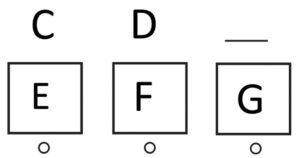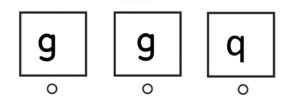What domains or skills are assessed on the FAST Star Early Literacy Test?
The following skills are assessed at the Early Literacy Level:
Foundational Skills
- General Readiness (Pre-K – K) is the ability to differentiate upper-case and lower-case letters from each other, words from letters, and match spoken words to written words.
- Graphophonemic Knowledge (Pre-K – 1st Grade) is a child’s understanding of the relationship between letters and sounds. Questions cover the ability to: identify letters either by name or sound, recognize letter sequences, match upper and lowercase letters, identify individual sounds (phonemes) in words (/k/ /a/ /t/ are sounds in “cat”), read or identify words, and identify words that are different or the same.
- Phonemic Awareness (Pre-K – 1st Grade) is a child’s ability to identify and manipulate individual sounds (or phonemes) in words. Questions cover the ability to: identify and manipulate individual word sounds (phonemes) in words read aloud to the child by the computer, identify rhyming words, and compare word lengths.
- Phonics (K – 3rd Grade) is the ability to: match sounds of spoken words to letters and groups of letters, identify beginning and ending sounds, recognize vowel sounds in words, replace vowels and consonants, or add new letters to make new words.
- Structural Analysis (1st – 3rd Grade) is the ability to: divide words into parts to understand their meaning and to identify compound words.
- Vocabulary (K – 3rd Grade) is the ability to: understand what words mean, match words and pictures, recognize antonyms and synonyms, and read words.
Comprehension and Meaning
- Comprehension (1st – 3rd Grade) is the ability to: understand words and passages within texts, read and complete sentences, and answer questions that demonstrate an understanding of paragraphs in passages.
Numbers and Operations
- Early Numeracy (Pre-K – 3rd Grade ) is the ability to: identify and name numbers, grasp number-object correspondence, extend patterns, sequences, and numeric order, compose and decompose groups of ten, compare sizes, weights, and volumes, and answer early addition and subtraction problems.
FAST Star Early Literacy Test Sample Questions:
Pre-Kindergarten:
1. These letters are in order. Choose the letter that is missing.

Answer: 1st bubble (an example of Graphophonemic Knowledge)
2. Which letter is different from the others? Choose the letter that does not match the others.

Answer: 3rd bubble (an example of General Readiness)
3. Listen to this word. h – ut. Choose the picture that has the name that I am saying: h – ut.
Answer: 2nd bubble (an example of Phonemic Awareness)
Kindergarten:
1. Which word is the longest?
Answer: 2nd bubble (an example of Phonemic Awareness)
2. Choose the letter that is the last sound you hear in the picture.
Answer: 2nd bubble (an example of Phonics)
3. Which of these is a word?
Answer: 2nd bubble (an example of Graphophonemic Knowledge)
1st Grade:
1. Choose the word that means the opposite of dark.
Answer: 1st bubble (an example of Vocabulary)
2. Choose the word that belongs in the blank.
We were tired, so we went to _________.
Answer: 1st bubble (an example of Comprehension)
3. Choose the picture that does not rhyme with…funny.
Answer: 2nd bubble (an example of Phonemic Awareness)
2nd Grade:
1. The numbers are three and four. Choose the number below that shows what these two numbers total when you add them together.
Answer: 1st bubble (an example of Early Numeracy)
2. Look at the word. Choose the answer that shows the correct way to divide the word by its syllables. Remember that a syllable is a single, unbroken sound of a written (or spoken) word.
Answer: 1st bubble (an example of Structural Analysis)
3. Choose the word that best completes the sentence.
Bill went across a ______ when he drove over the lake.
Answer: 2nd bubble (an example of Comprehension)
3rd Grade:
1. In which word does the vowel “o” sound the same way it sounds in the word “smoke”?
Answer: 1st bubble (an example of Phonics)
2. What time is it when both hands of a clock are on the 6?
a. 6:00
b. 6:15
c. 6:30
d. 6:06
Answer: c. 6:30 (an example of Early Numeracy)
3. Choose the number that comes next in this series.
39 38 36 33 29 ___
a. 21 b. 24 c. 27 d. 20
Answer: b. 24 (an example of Early Numeracy)
